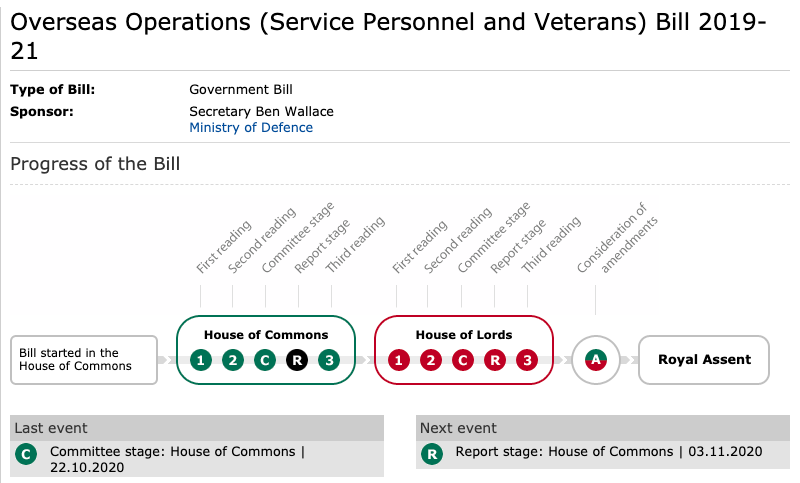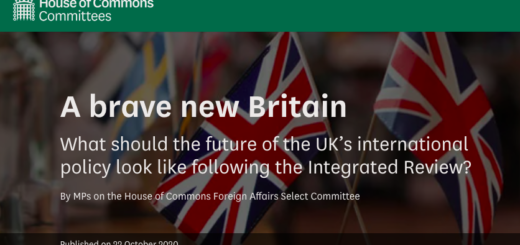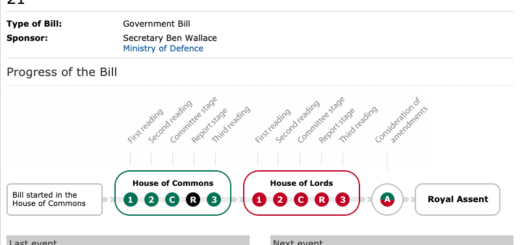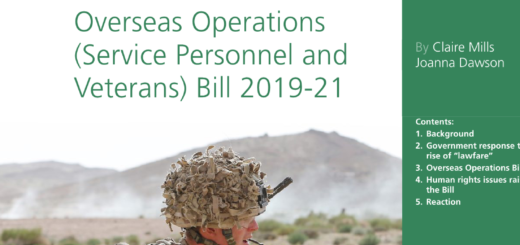
The Public Bill Committee stage has just been concluded, and soon the Overseas Operations (Services Personnel and Veterans) Bill will make its way to the House of Lords. The Public Bill Committee heard testimonies from a number of expert witnesses and received written evidence from stakeholders. Below is a summary of our submission, based on broad expert consultation and the aforementioned testimonials. Read the whole submission here.
Purpose of bill: does it solve the problem at hand?
Expert testimony given both in the Joint Committee on Human Rights (JCHR)[1] and the dedicated Public Bill Committee[2] has consistently shown that the logic, scope and intentions underpinning the Bill is deeply flawed and overall does not solve the aim of ending cycles of repeated investigations and cases against service personnel and veterans.[3]
The Bill addresses the wrong problem in ‘vexatious claims and prosecutions’: The stated problems of industrial size ‘vexatious prosecutions’ and ‘lawfare’ are not based on the available statistics.[4] Since 2000, twenty-seven prosecutions have been brought against service personnel or veterans, eight of which were convicted.[5] Not a single expert witness across both inquiries could name a prosecution that has been ‘vexatious’. Instead, multiple experts underlined the efficacy of the existing prosecutorial system in striking out unmeritorious claims and acting fairly in the public interest.[6]
The Bill does not ‘end the cycle of reinvestigation’: Experts across both legislative inquiries warned that the Bill will not solve the problem of protracted reinvestigations as it fails to address the deeper problem: flawed, ineffective and compromised investigations. To address this, the Bill must have at its heart the need to ensure prompt, independent, competent criminal investigations into future allegations.[7] Repeated cases involving Iraq and Afghanistan happened because insufficient independent criminal inquiries were made into credible allegations of abuse at the relevant time.
The Bill does not ‘provide greater certainty for service personnel and veterans’: It actively weakens protections for soldiers and limits their access to redress. The Bill is unable to reduce soldiers’ uncertainties about the prospect of re-investigation and prosecution because the UK is legally obliged to investigate alleged war crimes and other international crimes under a number of treaties.[8]
Costs versus benefits
Witnesses before the Bill Committee expressed support for the intent of the Bill. However, the overwhelming majority caveated this by raising significant concerns about the Bill as drafted, and called for it to be paused and rewritten.[9] Judge Blackett told the Committee: I fundamentally think the Bill is wrong, and I really believe it needs to be revised before it passes into law.” Witnesses, including Gen. Sir Nick Parker, stated that the Bill would have significant negative impacts on soldiers, victims and the public, as well as to the international rules-based order and the military’s ability to conduct operations overseas.[10]
Costs:
The Bill (1) undermines the fundamental legal principle of fairness and equality before the law, as set out by Judge Blackett. It also (2) undermines the UK’s international legitimacy, argued Gen. Sir Nick Parker. Referencing “eminent legal opinion that I trust,” he voiced (3) considerable concern for the operational effect of this Bill on UK partnerships and the enemy. In practice the Bill would also (4) increase the risk of torture and war crimes going unpunished.[11] It may (5) encourage copycat behaviour which would erode overall international standards, and lower those of other states’ troops.[12] This could increase impunity against detained UK troops.[13] and (6) put troops overseas in physical danger.[14] Near (if not) all witnesses objected to the absolute civil claims long-stop after six years as excessive. Director General at the Royal British Legion, Charles Byrne, said the (7) “longstop does not protect the armed forces personnel”, it protects the MOD. Finally, the Bill’s overly broad scope (8) inhibits Parliamentarians’ ability to scrutinise and evaluate military operations overseas. Parliament’s ability to scrutinise military action has already been undermined by contemporary military actions, and this bill would only serve to exacerbate these gaps in oversight.[15]
The Bill as drafted provides two limited benefits:
It will (1) outlaw protracted prosecutorial decisions. Notably, HMG could not name an example of this.[16] However, the Bill would not prevent cases from being reopened and investigated, as highlighted by John Larkin QC, former Attorney General of Northern Ireland, Judge Blackett and Gen Sir Nick Parker. The Bill (2) protects the MOD as an institution from civil claims brought by service personnel, veterans and overseas victims. Civil claims are only brought against the MOD - not individual people - either for its failure to protect its employees, or systemic or policy flaws that harm civilians. The Royal British Legion said of Part 2 of the Bill: “What happens if this Bill goes through is that it protects the Ministry of Defence from civil action—from someone bringing a case. That longstop does not protect the armed forces personnel.”[17]
Conclusion: doing something is not always better than doing nothing
As a champion of the rules-based order, the UK sets precedents that the rest of the world will follow. As neatly articulated by Judge Blackett, a fundamental element of this is universal application and adherence of international laws and norms; if passed in current form, the Bill fatally undermines this.
Recommendations
In agreement with the majority of expert testimonials provided to the Committee, the APPG on Drones recommends that the Bill is paused and redrafted to address the root cause of the problem: flawed investigations.[18][19]
The Bill neither identifies nor addresses the flaws in the current system, including the policy and doctrinal problems that led to investigations and litigations emanating from the wars in Afghanistan and Iraq. The MOD must improve its ability to learn from its mistakes, including rectifying faulty policy and improve internal structures to ensure mistakes are not repeated in future operations.
An effective Bill would address the system of flawed investigations, not just a symptom, this bill does not do this, Judge Blackett, Gen Sir Nick Parker, Emma Norton, Clive Baldwin and Martha Spurrier told the Committee.
The Bill further entrenches the MOD’s failure to protect soldiers. The MOD’s own data on compensation claims issued and settled against it, shows that between 2014 and 2019 75% of all claims related to allegations that it has breached its duty of care towards soldiers.[20] This bill will restrict service personnel and veterans’ access to redress.
The Bill provides an opportunity to bring together disjointed parallel processes on investigations, prosecutions and protecting civilians that are ongoing - or have been recently concluded - across Parliament and Government.[21]
The APPG on Drones welcomes the Defence Secretary’s announcement of the Judge-led inquiry into investigations of troops on 12 October. However, this should have preceded any legislation, and does not rectify the problems with this Bill highlighted by witnesses across both legislative inquiries. Recommendations regarding investigations and accountability of military operations have been set out following similar exercises. These include the Chilcot Inquiry and the Service Justice Systems review, published in 2016, and March 2018 and 2019, respectively; most have yet to be implemented by the government.
Footnotes
[1] Oral evidence given by Martyn Day, Senior Partner, Leigh Day, Reverend Nicholas Mercer, former Command Legal Advisor in Iraq, Mark Goodwin-Hudson, former British Army Officer and Elizabeth Wilmshurst CMG, Chatham House, 28 September 2020, https://bit.ly/3dvlwYY Oral evidence given by Johnny Mercer MP, Minister for Defence People and Veterans, Baroness Goldie, Minister of State, Katherine Willerton, Deputy Director, Legal Advisers, Ministry of Defence and Damian Parmenter, Director of the Defence and Security Industrial Strategy. Ministry of Defence, 5 October 2020, https://bit.ly/3dlRlD
[2] Oral evidence given by: Douglas Young, the former chairman of the British Armed Forces Federation and Michael Sutcliff, Chairman, the Armed Forces Support Group, 6 October 2020, https://bit.ly/313fsSf; Hilary Meredith, Hilary Meredith solicitors, 6 October 2020, https://bit.ly/34QfwpL; Major Robert Campbell, 6 October 2020, https://bit.ly/2SQ1VsT; Professor Richard Ekins, Head of Policy Exchange’s Judicial Power Project and Professor of Law and Constitutional Government at the University of Oxford, John Larkin QC, former Attorney General of Northern Ireland and Dr Jonathan Morgan, Reader in English law at the University of Cambridge and a fellow of Corpus Christi College, 6 October 2020, https://bit.ly/3lM6Szr ; Ahmed Al-Nahhas, Representative of the Association of Personal Injury Lawyers and Emma Norton, Director, Centre for Military Justice, 6 October 2020, https://bit.ly/372H2TK ; Martha Spurrier, Director for human rights, Liberty and Clive Baldwin, legal adviser, Human Rights Watch, 6 October 2020, https://bit.ly/31joVVZ ; Charles Byrne, Director General of the Royal British Legion, General Sir John McColl, Chairman, the Confederation of Service Charities and General (Retd) Sir Nick Parker, 8 October 2020, https://bit.ly/3iWcHse ; Lieutenant Colonel (Retd) Chris Parker, Chairman, the Princess of Wales’s Royal Regiment Association, 8 October 2020, https://bit.ly/3nIE3FM; His Honour Judge Jeff Blackett, Judge Advocate General (Retd)(2004- 30/09/2020), 8 October 2020, https://bit.ly/3nMA4rO
[3] The Bill’s stated purpose is to “to provide greater certainty for Service personnel and veterans in relation to vexatious claims and prosecution of historical events, that occurred in the uniquely complex environment of armed conflict overseas” and “represents one strand of the Government’s approach to addressing the problem of “Lawfare” (the judicialisation of armed conflict) and to ending the cycle of reinvestigation of historic events”.
[4] Public Bill Committee, Witness: Martha Spurrier
[5] Oral evidence to the Joint Committee on Human Rights Legislative Scrutiny Inquiry given by Johnny Mercer MP, Minister for Defence People and Veterans, Baroness Goldie, Minister of State, Katherine Willerton, Deputy Director, Legal Advisers, Ministry of Defence and Damian Parmenter, Director of the Defence and Security Industrial Strategy. Ministry of Defence, 5 October 2020, https://bit.ly/3dlRlD
[6] Prosecutors, the courts and the regulators already have extensive powers – which they exercise all the time - to deal with the issues the Bill purports to address.4 In addition, as outlined by Gen Sir John McColl and echoed by Charles Byrne of the Royal British Legion and Gen. Sir Nicholas Parker - retired Commander-in-Chief for the Land Forces - in their evidence, training of service personnel to handle stresses of deployment is adequate, and already taken into account by prosecutors.
[7] Witnesses: Judge Blackett, Gen. Sir Nick Parker, Clive Baldwin, Martha Spurrier, Emma Norton, see also testimonials given to the JCHR’s Legislative Scrutiny Inquiry by Martyn Day, Senior Partner, Leigh Day, Reverend Nicholas Mercer, former Command Legal Advisor in Iraq, Mark Goodwin-Hudson, former British Army Officer and Elizabeth Wilmshurst CMG, Chatham House, 28 September 2020, https://bit.ly/3dvlwYY
[8] This includes the Geneva Conventions, Additional Protocol I, the Convention Against Torture and customary international law. See Wallace, Stubbins Bates and Quenivet, Legal Protections for Armed Forces Personnel and Veterans Serving in Operations Outside the United Kingdom: Response to Public Consultation Questionnaire, October 1, 2019, p. 6
[9] Witnesses: Judge Blackett, Sir Nick Parker, Clive Baldwin Human Rights Watch, Martha Spurrier ( Liberty), Emma Norton (Centre for Military Justice), Ahmed AlNahhas (solicitor and representative of the Association of Personal Injury Lawyers)
[10] Witnesses: Gen. Sir Nick Parker, Judge Blackett, Clive Baldwin Human Rights Watch, Martha Spurrier Liberty.
[11] Public Bill Committee, Witnesses: Martha Spurrier, Clive Baldwin, Judge Blackett and Gen. Sir Nick Parker. In addition, JCHR scrutiny inquiry: Elizabeth Wilmshurst, Martyn Day and Revd. Nicholas Mercer
[12] Revd. Nicholas Mercer, former Command Legal Advisor, UK 1st Armoured Division, Iraq War, https://www.youtube.com/watch?v=6DI78LOT9B8&t=3s&ab_channel=FreedomfromTorture
[13] Ibid.
[14] Ibid.
[15] The Role of Parliament in the UK Constitution: Authorising the Use of Military Force, Public and Administrative Affairs Committee Inquiry Report, 2019.
[16] . According to HMG, to this date only twenty-seven people have been prosecuted, none of which were considered vexatious. Oral evidence to the Joint Committee on Human Rights Legislative Scrutiny Inquiry given by Johnny Mercer MP, Minister for Defence People and Veterans, Baroness Goldie, Minister of State, Katherine Willerton, Deputy Director, Legal Advisers, Ministry of Defence and Damian Parmenter, Director of the Defence and Security Industrial Strategy. Ministry of Defence, 5 October 2020, https://bit.ly/3dlRlD
[17] This was in response to the Minister for Defence People and Veterans argument that Part 2 - including limiting troops’ rights to make a claim against the MOD - was necessary to protect the MOD. He further said that because it would be unlawful to discriminate against one group of claimants - those living overseas - by limiting their rights to bring a claim against the MOD, it was necessary to apply the same absolute time-limit to service personnel and veterans too, in order to protect the MOD.
[18] Witnesses: Judge Blackett, Gen Sir Nick Parker, Charles Byrne, Martha Spurrier, Clive Baldwin, Emma Norton, Ahmed Al-Nahhas
[19] Mrs Lewell-Buck: “Would either of you advocate a pause on the Bill going through right now until some of the issues can be ironed out properly?” Emma Norton: “I am happy to say that I would, personally. That would have been a sensible way to go about it—to have a consultation that would really hear from individuals who had been directly affected by investigations, as well as victims, and to speak to experts who can talk to the challenges of building a really good system of investigations overseas, because it is really difficult and we do not underestimate that. There are lots of things that could be done and could be done better…It would have been more sensible to have those discussions first and then look at what was needed by way of amendments to the criminal law. It feels very much—we have heard this a couple of times today—that this is a cart before the horse situation”
[20]Liberty Briefing on the Overseas Operations (Service Personnel and Veterans) Bill for Second Reading, see footnote 23, p.12
[21] These include the Overseas Operations Bill, Services Justice System Review (SJSR), UK Strategy on Protection of Civilians, efforts within the MOD to implement Chilcot 17 (on civilian casualties) and most recently the announcement of a judge-led inquiry into investigations of troops. In addition, the Integrated Security, Defence and Foreign Policy Review is underway and the Armed Forces Bill is due next year.




